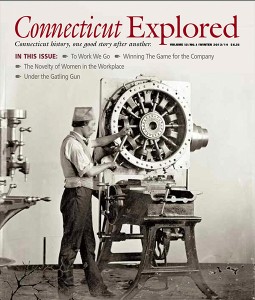(c) Connecticut Explored Inc. Winter 2013/2014
Subscribe/Buy the Issue!
How often do you shake your head and think, “How times have changed!” Then again, how often do you surprisingly find yourself thinking, “Some things never change!” And that goes for work, which is the subject of this issue and a year-long project led by Connecticut Humanities called Connecticut at Work.
The media is rife with stories about how different the job market is today, but when my daughter graduated from college two years ago, one aspect of her job search took me back nearly 30 years to my own first job hunt. Fresh out of Smith College in 1983, I was looking for a toehold on the corporate ladder. People would suggest to me that I might have to start out as a secretary, a notoriously dead-end position usually held by women. This young feminist’s response was, “If the 22-year-old guy next to me doesn’t have to do that, why would I?”
Happily, my daughter did not receive such advice. What she landed, though, was an entry-level corporate job that involved staffing the switchboard half of the day. Having just paid an obscene amount of money to put her through four years of college, part of me was aghast that she’d found a job that didn’t appear to require a college degree. Had we made so little progress since 1983?
Another part of me, though, was grateful she’d secured a coveted full-time job with salary, benefits, and paid vacation at a time when full-employment jobs constitute an ever-smaller percentage of jobs available. And with relief I soon learned that the person answering the phones the other half of the day was another young college graduate—who was male. We’ve at least come far enough that such a task assignment is gender blind. What had changed in the intervening 30 years was that college graduates were now being hired for jobs that had previously gone to high-school graduates.
Fortunately, the story has a happy ending in that about a year later the company automated the switchboard, and my daughter moved on to more challenging work. She’d jumped another hurdle our young people frequently encounter: underemployment. A person who is working part time when he or she desires full-time work or is working in a job that does not use his or her education or skills is “underemployed.” Part-time, seasonal, temporary, low-wage, low-skill—these are the characteristics of many of the jobs available today. As Catherine Rampell pointed out in a New York Times article earlier this year (“College Graduates Fare Well in the Jobs Market,” May 3, 2013), “Just because college graduates have jobs does not mean they all have ‘good’ jobs.”
My first job—as an entry-level expense analyst—was with Travelers in Hartford. Read Tracey Wilson’s story in this issue about the conditions under which women worked at Travelers and Colt’s Manufacturing in the early decades of the 20th century and you’ll appreciate, as I do, how times and work have changed for the better.
What is the future of work? The high-flying success of tech’s bold-faced names (think Gates, Jobs, and Zuckerberg) has created a renewed sense of what one person with an idea can do. Connecticut history is replete with such figures: Colt, Whitney, Terry, Borden, Fuller, Sikorsky … the list goes on. Could Connecticut see a return of this game-changing level of entrepreneurial and inventive spirit? Attend one of the Connecticut at Work programs in the coming year to touch on this and other provocative questions about the future of work in the state.
Read the Issue!
Read all of our stories about Labor history on our TOPICS page

